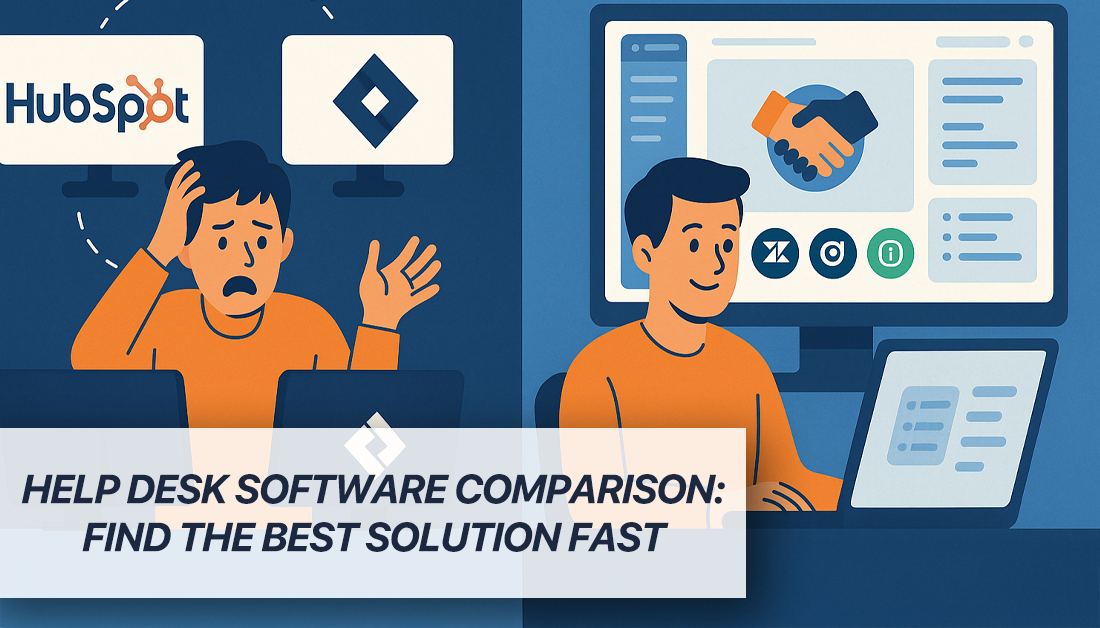Tired of Toggling Between HubSpot and Jira?
Stop juggling tools. This help desk software comparison helps you choose the right platform to unite your HubSpot CRM, Jira projects, and customer support workflows. Discover how to improve inter-team collaboration, centralize data, and enhance customer satisfaction by integrating your help desk seamlessly. We’ll explore key solutions like Zendesk, Freshdesk, HubSpot Service Hub, ServiceNow, Jira Service Management, Help Scout, Zoho Desk, and LiveAgent, focusing on their integration capabilities with your existing tech stack. This comparison empowers you to make an informed decision and eliminate the frustration of constant context switching.
1. Zendesk
Zendesk is a prominent contender in any help desk software comparison, frequently chosen by businesses ranging from startups to enterprises. Its popularity stems from a comprehensive platform that aims to enhance customer relationships through integrated support, sales, and engagement tools. This makes it a strong option for teams already invested in the HubSpot ecosystem, looking for robust customer service solutions that can potentially integrate with their existing workflows. For those conducting a help desk software comparison, Zendesk’s breadth of features makes it worthy of consideration.
Zendesk’s core strength lies in its ticketing system. This system enables support teams to efficiently track, prioritize, and resolve customer issues, a key factor in any help desk software comparison. Furthermore, its omnichannel support capabilities, including email, chat, phone, and social media, allow businesses to meet customers where they are. This is particularly important for teams seeking a unified customer experience, a common goal for those evaluating a help desk software comparison. Imagine a support agent in Jira needing access to a customer’s HubSpot sales deal information – a robust integration between the two could be invaluable.
Key Features and Benefits:
- Omnichannel Support: Manage all customer interactions – email, chat, phone, and social media – within a single platform. This unified approach streamlines workflows and contributes to a consistent customer experience. If your team uses multiple channels, Zendesk’s omnichannel strength is a significant point in a help desk software comparison.
- AI-Powered Automation and Self-Service: Automate repetitive tasks and empower customers with self-service options through a knowledge base and community forums. This can free up agents to focus on complex issues and contribute to faster resolution times, a key consideration in any help desk software comparison.
- Customizable Ticket Views and Workflows: Tailor Zendesk to match your specific business processes, ensuring a seamless fit within your existing workflows, whether they involve Jira, HubSpot, or other tools. This flexibility is crucial in a help desk software comparison.
- Robust Reporting and Analytics Dashboard: Gain valuable insights into support performance with detailed reports and analytics. Track key metrics, identify areas for improvement, and make data-driven decisions. Data analysts and reporting specialists will find this particularly useful during a help desk software comparison.
- Knowledge Base and Community Forum Capabilities: Empower customers to find answers themselves with a comprehensive knowledge base and community forum. This fosters self-service and reduces the burden on support agents, a factor worth considering in any help desk software comparison.
- Extensive Integrations: Zendesk boasts integrations with hundreds of apps and services, expanding its functionality and allowing it to connect with existing tools like Jira and potentially even HubSpot. This interoperability is a significant advantage when conducting a help desk software comparison.
Pros:
- Highly Customizable and Scalable: Suitable for businesses of all sizes, allowing them to adapt and grow with evolving needs.
- Extensive Integration Options: Connects with a wide range of third-party applications, enhancing functionality and interoperability.
- Comprehensive Knowledge Management Tools: Provides robust features for creating and managing a knowledge base, promoting self-service and reducing support ticket volume.
- Strong Mobile Support Options: Enables agents to access and manage tickets on the go, improving responsiveness and flexibility.
Cons:
- Higher Price Point: Can be more expensive than some competitors, potentially impacting budget considerations during a help desk software comparison.
- Steep Learning Curve for Administrators: Requires some technical expertise to fully configure and manage, especially for larger implementations.
- Some Advanced Features Require Higher-Tier Plans: Certain features are locked behind higher pricing tiers, potentially requiring additional investment.
- Complex Setup Process for Larger Implementations: Can be challenging to set up and configure for larger organizations with complex workflows.
Website: https://www.zendesk.com/
Implementation Tips:
- Start with a well-defined implementation plan that outlines your specific requirements and objectives.
- Take advantage of Zendesk’s extensive documentation and training resources.
- Consider starting with a smaller pilot implementation to test and refine your configuration before rolling it out to the entire organization.
Comparison with Similar Tools:
While Zendesk offers a robust suite of features, other tools like Freshdesk and Zoho Desk provide competitive alternatives, often at a lower price point. These alternatives might be a better fit for smaller businesses or those with more limited budgets, and should be included in a thorough help desk software comparison.
Why Zendesk Deserves its Place in the List:
Zendesk’s comprehensive feature set, scalability, and wide range of integrations make it a strong contender in any help desk software comparison. While the price point might be higher than some competitors, its robust functionality justifies the investment for many businesses, particularly those looking for advanced features and seamless integration with other tools. However, the complexity of setup and administration should be carefully considered, especially for larger organizations and teams who prioritize simplicity and quick implementation in their help desk software comparison. It is crucial to weigh these factors against your specific needs and budget to determine if Zendesk is the right solution for your business.
2. Freshdesk
Freshdesk is a cloud-based help desk software that earns its place in this help desk software comparison because of its balance of robust features, user-friendliness, and affordability. It empowers businesses, from startups to enterprises, to deliver excellent customer support through a variety of channels. This is particularly relevant for teams using HubSpot and Jira, who often grapple with maintaining a seamless flow of customer information across sales, marketing, and support functions. Choosing the right help desk software is crucial for these teams, and Freshdesk provides a compelling option.
For Jira administrators and DevOps managers dealing with technical issues reported by customers, Freshdesk offers a streamlined way to manage and track those issues. Sales and marketing teams using HubSpot can benefit from Freshdesk’s integration capabilities, allowing them to connect customer interactions with sales pipelines and marketing campaigns. Customer support and service agents directly benefit from Freshdesk’s core functionality, efficiently handling support tickets and communicating with customers. Product and project management teams gain valuable insights from customer feedback collected through Freshdesk, informing product development and roadmap planning. Finally, data analysts and reporting specialists can leverage Freshdesk’s reporting and analytics capabilities to track key metrics and identify areas for improvement in customer support.
Key Features & Benefits:
- Ticket Management with Automation: Freshdesk’s ticket management system allows for automated ticket routing, assignment, and prioritization based on predefined rules and SLA policies. This automation reduces manual effort and ensures timely responses to customer inquiries. Imagine a Jira administrator automatically receiving a Freshdesk ticket every time a customer reports a bug via the HubSpot CRM. This streamlined workflow allows for rapid response and resolution.
- Multi-Channel Support: Freshdesk supports multiple communication channels, including email, phone, chat, and social media. This omnichannel approach provides a unified platform for managing all customer interactions, regardless of the channel. Consider a marketing team running a HubSpot campaign that generates customer queries on various social media platforms. Freshdesk can consolidate these interactions, making them manageable from a single interface.
- Team Collaboration: Features like ticket assignment, sharing, and internal notes facilitate seamless collaboration among team members. This ensures that everyone is on the same page and that customer issues are resolved efficiently. For product teams using Jira, this collaboration feature can be invaluable for linking customer feedback from Freshdesk directly to relevant Jira issues.
- Self-Service Portal & Knowledge Base: Empowering customers to find solutions on their own through a self-service portal and a comprehensive knowledge base reduces the load on support agents and improves customer satisfaction. For DevOps teams, this could mean fewer repetitive tickets about known bugs or feature requests, freeing them up to focus on more complex issues.
- Reporting and Analytics: Freshdesk offers extensive reporting and analytics capabilities, allowing businesses to track key metrics like resolution time, customer satisfaction, and agent performance. These insights are crucial for data-driven decision-making and continuous improvement in customer service delivery.
Pros:
- Affordable Pricing: Freshdesk offers a generous free tier and competitive pricing plans, making it accessible to businesses of all sizes.
- User-Friendly Interface: The intuitive interface requires minimal training, allowing teams to get up and running quickly. This is a huge plus for teams already juggling multiple platforms like HubSpot and Jira.
- Quick Implementation: The setup process is straightforward, enabling rapid deployment and integration with existing systems.
- Robust Automation: Even lower-tier plans come with robust automation features, providing significant value for money.
Cons:
- Advanced Customization: Implementing advanced customization might require developer skills.
- Occasional Performance Issues: Some users have reported occasional performance hiccups, although this is not a widespread issue.
- Limited Mobile App: The mobile app functionality is somewhat limited compared to the desktop version.
- Inconsistent Email Parsing: Email parsing can struggle with complex email threads, potentially leading to missed information.
Implementation Tips:
- Integrate with HubSpot and Jira: Leverage available integrations to connect Freshdesk with your existing HubSpot CRM and Jira instances for a seamless flow of customer data.
- Customize workflows: Tailor Freshdesk workflows to match your specific support processes and team structure.
- Build a comprehensive knowledge base: Invest time in creating a well-structured and informative knowledge base to empower customers and reduce support ticket volume.
- Train your team: While Freshdesk is user-friendly, ensure your team receives adequate training to maximize its potential.
Comparison with similar tools: While tools like Zendesk offer similar functionality, Freshdesk often stands out due to its affordability and ease of use, especially for smaller to medium-sized businesses. Zendesk can be more powerful for enterprise-level needs, but it comes at a significantly higher price point.
Website: https://freshdesk.com/
Freshdesk stands out in a help desk software comparison by providing a balanced solution. It caters to diverse team needs and integrates well with existing tools like HubSpot and Jira, making it a valuable asset for businesses aiming to elevate their customer support. Its focus on automation and collaboration features makes it particularly attractive for streamlining workflows and optimizing team efficiency.
3. HubSpot Service Hub
HubSpot Service Hub is a powerful option for businesses already invested in the HubSpot ecosystem, offering a streamlined help desk experience integrated with your marketing, sales, and CRM data. This allows for a holistic view of the customer journey, enabling personalized support and efficient collaboration across departments. Service Hub provides tools to manage tickets, build a knowledge base, gather customer feedback, and automate key processes – all within the familiar HubSpot interface. This makes it a compelling choice for those seeking a unified platform, rather than juggling disparate tools. For teams already using HubSpot’s CRM, adding Service Hub can be a natural progression towards enhanced customer service capabilities. This approach can be particularly valuable for organizations focused on aligning sales and service strategies, fostering better customer relationships, and driving revenue growth.
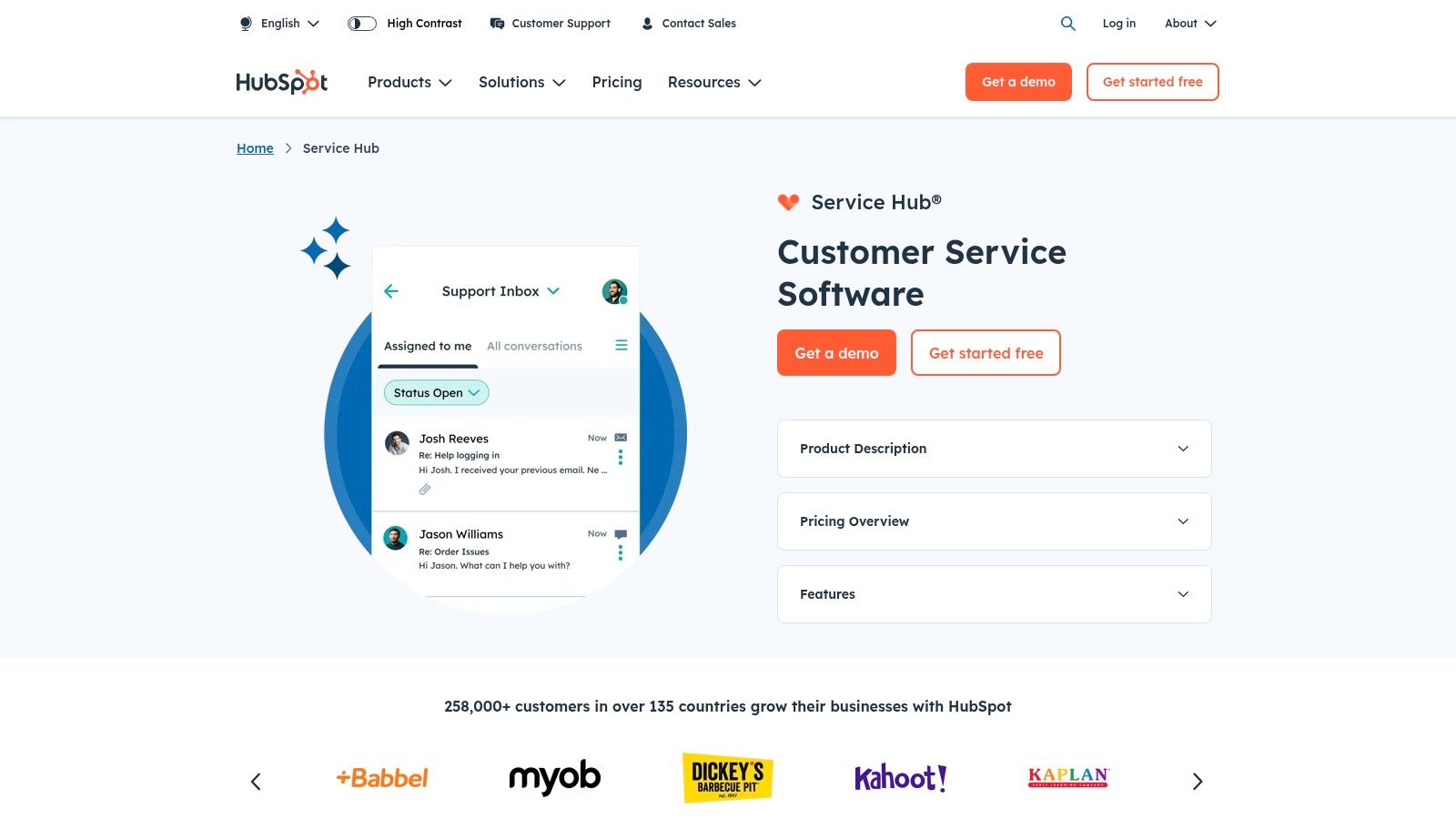
Key Features and Benefits:
- Unified Platform: Seamlessly integrated with HubSpot’s CRM, Marketing, and Sales Hubs, allowing for a 360-degree view of the customer and streamlined workflows. This is a significant advantage for data-driven decision-making, as explored in this article: Learn more about HubSpot Service Hub. This integration facilitates better communication and collaboration between teams, particularly valuable for Jira administrators, DevOps managers, and product teams looking to bridge the gap between customer feedback and product development.
- Conversation Inbox: Manage all customer interactions, including emails, chat messages, and social media comments, from a single unified inbox. This feature benefits customer support and service agents by simplifying their workflow and providing a centralized point of contact.
- Customer Feedback Tools: Gather valuable insights with tools like NPS surveys to understand customer satisfaction and identify areas for improvement. Data analysts and reporting specialists can leverage this data for informed decision-making.
- Knowledge Base and Community Forums: Empower customers with self-service resources and foster a sense of community, reducing support ticket volume and improving customer satisfaction.
- Automation: Automate ticket routing, customer follow-ups, and other repetitive tasks, freeing up agents to focus on more complex issues. This automation can be a powerful tool for improving team efficiency, a key concern for Jira administrators and DevOps managers.
Pricing: HubSpot Service Hub offers a free tier with basic features, followed by tiered paid plans (Starter, Professional, and Enterprise) with increasing functionality and user limits. The cost increases significantly when utilizing multiple HubSpot hubs, which is a crucial consideration when conducting a help desk software comparison.
Technical Requirements: As a cloud-based solution, HubSpot Service Hub requires a stable internet connection. Integration with other HubSpot products is seamless. For deeper integrations with platforms like Jira, consider solutions available on the Atlassian Marketplace, offering two-way data sync, CRM-issue sync, and other advanced features.
Comparison with Similar Tools: While HubSpot Service Hub offers a robust set of features, dedicated help desk solutions like Zendesk and Freshdesk often provide more specialized functionality and customizable workflows. However, the tight integration with HubSpot’s CRM makes Service Hub a compelling option for existing HubSpot users seeking a unified platform.
Implementation/Setup Tips:
- Define your key metrics: Before implementation, identify the KPIs you’ll use to measure success, such as ticket resolution time and customer satisfaction.
- Customize your workflows: Tailor your ticket workflows to match your specific support processes.
- Build a comprehensive knowledge base: Empower customers with self-service resources to reduce ticket volume.
- Integrate with other tools: Connect Service Hub with other essential tools, such as Jira, to streamline workflows and improve collaboration. Consider exploring options for “HubSpot integration” and “Jira integration” on the Atlassian Marketplace for advanced features like two-way field sync, automatic ticket creation, and comment mirroring.
Pros:
- All-in-one platform for marketing, sales, and service.
- Complete customer view with unified data across departments.
- Strong reporting capabilities with custom dashboards.
- Excellent for alignment between service and sales teams.
Cons:
- Higher total cost when using multiple HubSpot products.
- Less specialized help desk features compared to dedicated solutions.
- Limited customization options for ticket workflows.
- Free tier has significant limitations for service features.
Website: https://www.hubspot.com/products/service
This integrated approach, combined with the focus on customer success and data-driven insights, solidifies HubSpot Service Hub’s place in this help desk software comparison. While the cost can be a factor, the benefits of a unified platform and the potential for improved customer experiences make it a strong contender, especially for existing HubSpot users. This is particularly relevant for rev-ops leaders, support managers, and product teams who already use HubSpot CRM and are looking to enhance their customer service capabilities.
4. ServiceNow
ServiceNow is a powerful enterprise-level IT service management (ITSM) platform offering robust help desk functionality within a much broader suite of capabilities. Designed for large organizations with complex needs, ServiceNow provides extensive customization and workflow automation, extending beyond IT support to manage customer service and other business areas through a unified platform. In a help desk software comparison, ServiceNow stands out for its comprehensive approach, though this comprehensiveness comes at a cost. This platform is particularly relevant for Jira administrators, DevOps managers, and data analysts seeking robust reporting and integration capabilities. It can also be leveraged by sales and marketing teams, customer support agents, and product managers looking for a centralized platform to manage various business processes.
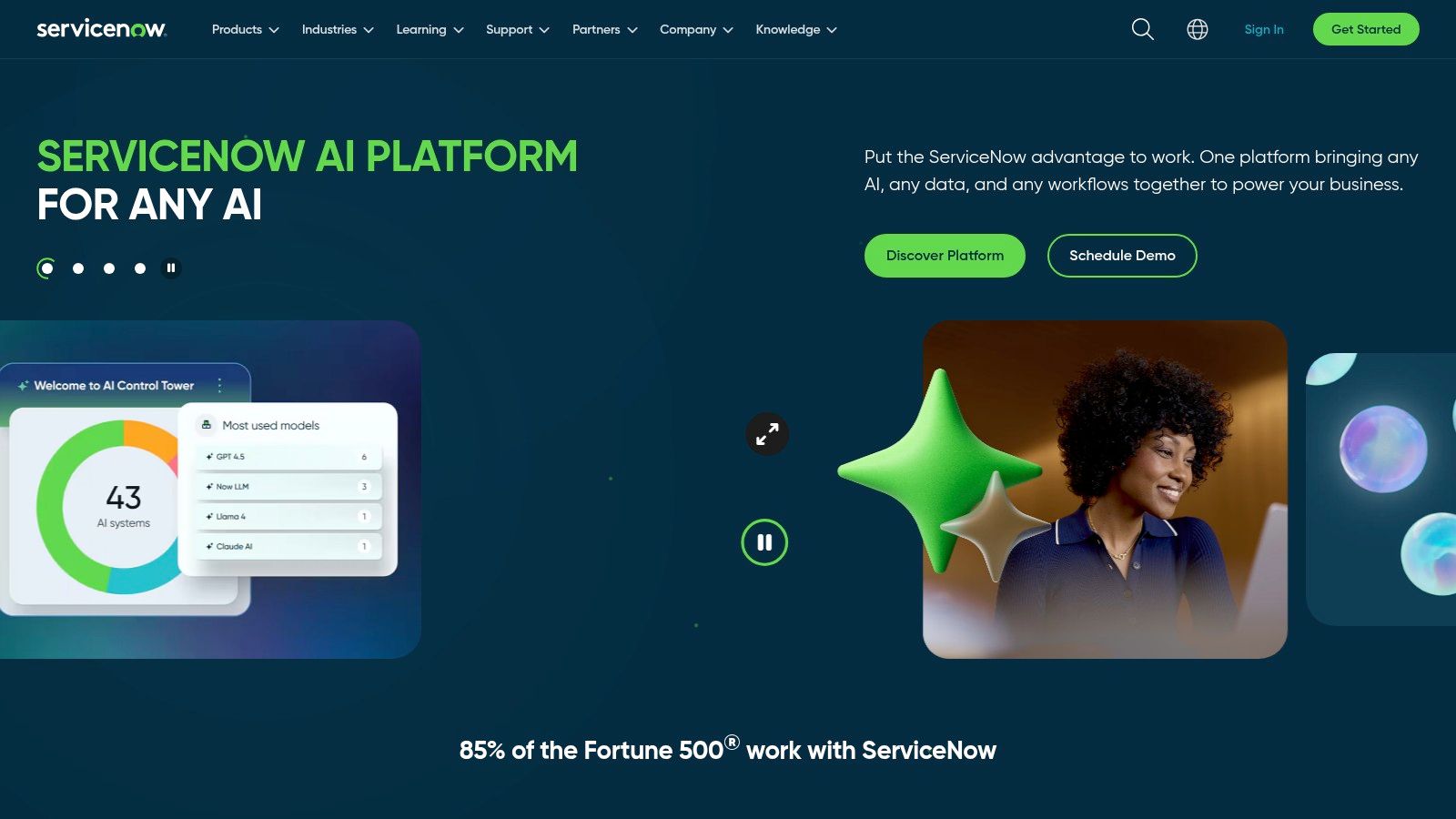
ServiceNow deserves a place in this help desk software comparison due to its comprehensive nature. Its features go far beyond basic ticketing systems, offering advanced functionalities like ITIL-aligned processes, sophisticated service catalogs, and robust asset management. Its powerful reporting and analytics engine empower data-driven decision-making, crucial for optimizing service delivery and identifying areas for improvement. Learn more about ServiceNow to delve deeper into its enterprise-grade capabilities.
Key features for consideration in a help desk software comparison include its enterprise-grade ticket management and workflow automation capabilities. It allows for the automation of complex support processes, from ticket routing and escalation to automated notifications and approvals. This can significantly improve efficiency and reduce response times. Its ITIL alignment ensures adherence to best practices, fostering a structured approach to service management. The advanced service catalog and request fulfillment functionality empowers users to easily request services and track their progress, streamlining service delivery. Comprehensive asset management allows organizations to track and manage their IT assets throughout their lifecycle. Finally, the platform’s powerful reporting and analytics capabilities provide valuable insights into performance metrics, helping organizations identify trends, optimize resource allocation, and improve overall service quality.
Pros:
- Highly Customizable: ServiceNow’s flexibility allows it to be tailored to the specific needs of even the most complex enterprises. This is a key advantage in a help desk software comparison, as it ensures a perfect fit for the organization’s unique workflows.
- Extensive Integrations: Seamless integration with other enterprise systems, including Jira, enhances data flow and collaboration across departments. This interoperability is particularly beneficial for Jira administrators and DevOps managers seeking a unified platform for managing IT operations.
- Strong Governance & Compliance: Built-in features for compliance and governance ensure adherence to industry regulations, a crucial aspect for organizations operating in regulated environments.
- Comprehensive Solution: ServiceNow extends beyond help desk functionality, offering a single platform for managing IT services, customer service, HR, and other business functions. This holistic approach can be highly beneficial for larger organizations.
Cons:
- High Cost: ServiceNow’s comprehensive features come at a significant price, making it a substantial investment compared to other help desk solutions. This is a critical factor to consider during a help desk software comparison, especially for smaller organizations with limited budgets.
- Complex Implementation: Implementing ServiceNow typically requires specialized expertise and a significant time investment. This can be a hurdle for organizations lacking internal resources or the budget for external consultants.
- Steep Learning Curve: The platform’s complexity can lead to a steep learning curve for both administrators and end-users. Adequate training is essential for successful adoption.
- Overkill for Smaller Organizations: ServiceNow’s robust feature set may be unnecessarily complex for smaller organizations with simpler help desk needs.
Pricing & Technical Requirements: ServiceNow’s pricing is subscription-based and varies depending on the modules and features selected. Specific technical requirements depend on the deployment model (cloud or on-premise) and integration needs. Contacting ServiceNow directly for a personalized quote and detailed technical specifications is recommended.
Comparison with Similar Tools: While ServiceNow is a powerful enterprise-level solution, other tools like Jira Service Management offer robust help desk capabilities with a greater focus on IT service management and integration with the Atlassian ecosystem. For smaller businesses, solutions like Zendesk or Freshdesk might be more cost-effective and easier to implement. Conducting a thorough help desk software comparison, evaluating the specific needs of your organization, is crucial before making a decision.
Implementation Tips:
- Clearly define your requirements: Before implementing ServiceNow, thoroughly assess your organization’s specific needs and pain points.
- Engage with a certified implementation partner: Leverage the expertise of a ServiceNow partner to ensure a smooth and successful implementation.
- Develop a robust training plan: Provide comprehensive training to both administrators and end-users to maximize adoption and effectiveness.
ServiceNow offers a powerful, albeit complex, solution for enterprise-level help desk and ITSM needs. Its comprehensive features and customization options make it a strong contender in any help desk software comparison, particularly for larger organizations with complex requirements. However, the cost and complexity should be carefully considered before making a decision.
5. Jira Service Management
Jira Service Management (formerly Jira Service Desk) is a robust help desk solution particularly popular with IT teams and development-focused organizations looking for strong integration with their existing Atlassian ecosystem. Built upon Jira’s powerful workflow engine, it allows for deep customization and automation, enabling teams to collaborate effectively on support issues while still offering a streamlined interface for end-users. This platform truly excels at connecting development and operations teams, facilitating faster resolution of technical issues. This makes it a compelling choice in a help desk software comparison, particularly for organizations already invested in the Atlassian suite.
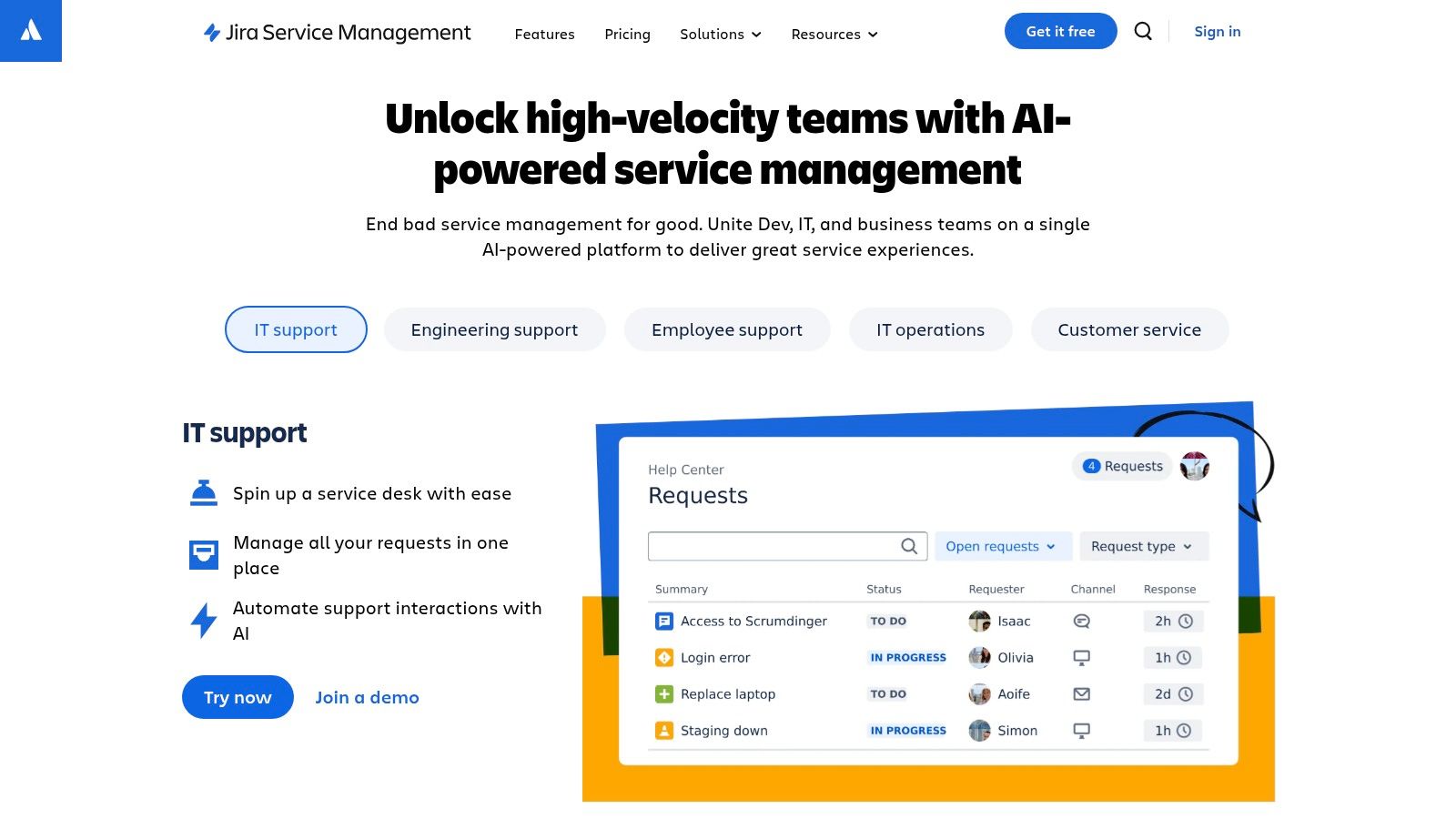
Jira Service Management’s strength lies in its ability to handle complex workflows and automations. Imagine a scenario where a customer reports a bug. With Jira Service Management, this report can automatically generate a Jira issue, assign it to the appropriate development team, and trigger notifications. As the development team works on the fix, updates are seamlessly relayed back to the customer through the self-service portal. This tight integration between development and support streamlines communication and significantly reduces resolution time. Learn more about Jira Service Management and explore different dashboard examples to understand its visualization capabilities. This is particularly beneficial for DevOps managers and product teams looking for a unified platform for managing development and support workflows.
Features:
- Powerful workflow engine with customizable automation: Tailor workflows to specific team needs and automate repetitive tasks.
- Native integration with other Atlassian products: Seamlessly connect with Confluence for knowledge management and Jira for development tracking. This is especially relevant when performing a help desk software comparison, as integration capabilities are a key consideration.
- ITIL-certified service management capabilities: Adhere to ITIL best practices for structured service delivery.
- DevOps-friendly with strong integration to development workflows: Bridge the gap between development and operations for faster issue resolution.
- Self-service portal with knowledge base capabilities: Empower customers to find solutions and submit requests independently.
Pros:
- Excellent for technical teams already using Atlassian products, eliminating the need for context switching and data silos.
- Strong change management and release management capabilities, crucial for DevOps-focused organizations.
- Highly customizable workflows and automation, enabling teams to adapt the system to their unique processes.
- Robust for IT service management use cases, providing a comprehensive solution for IT support.
Cons:
- Less intuitive for non-technical support teams, potentially requiring more extensive training.
- Complex setup and configuration process, demanding specialized knowledge for optimal implementation.
- Limited native omnichannel support options, which may require third-party integrations.
- Can become expensive as you add users and additional Atlassian products. Pricing varies depending on the number of agents and add-ons required. Refer to Atlassian’s website for detailed pricing information.
Website: https://www.atlassian.com/software/jira/service-management
Implementation Tips:
- Start with a well-defined service desk structure, mapping out your teams, request types, and workflows.
- Leverage the extensive documentation and community resources available for Jira Service Management.
- Begin with a pilot project to test configurations and refine processes before a full-scale rollout.
- Consider engaging an Atlassian expert for assistance with complex configurations and integrations.
Jira Service Management earns its place in this help desk software comparison due to its powerful automation, deep integration with the Atlassian ecosystem, and robust IT service management capabilities. While it might present a steeper learning curve for non-technical teams and can be costly, its strengths make it a valuable asset for technical teams, DevOps managers, and organizations seeking a highly customizable and integrated help desk solution. For teams already leveraging HubSpot and Jira, considering integrations like HubSpot for Jira can further enhance customer success by bridging the gap between sales, marketing, and support efforts. This allows for seamless data flow and enhanced collaboration across departments. Remember to consider your specific needs and conduct a thorough help desk software comparison to determine the best fit for your organization.
6. Help Scout
Help Scout is a popular choice in the help desk software comparison landscape, especially for small to medium-sized businesses (SMBs) prioritizing personalized customer service. It distinguishes itself with a shared inbox approach, moving away from the impersonal feel of traditional ticketing systems. This focus on conversations rather than tickets makes it ideal for businesses aiming to build stronger customer relationships. If your team values a clean, user-friendly interface and personalized interactions, Help Scout might be the perfect fit. This platform helps streamline customer communications and improve satisfaction without requiring extensive training or complex configurations.
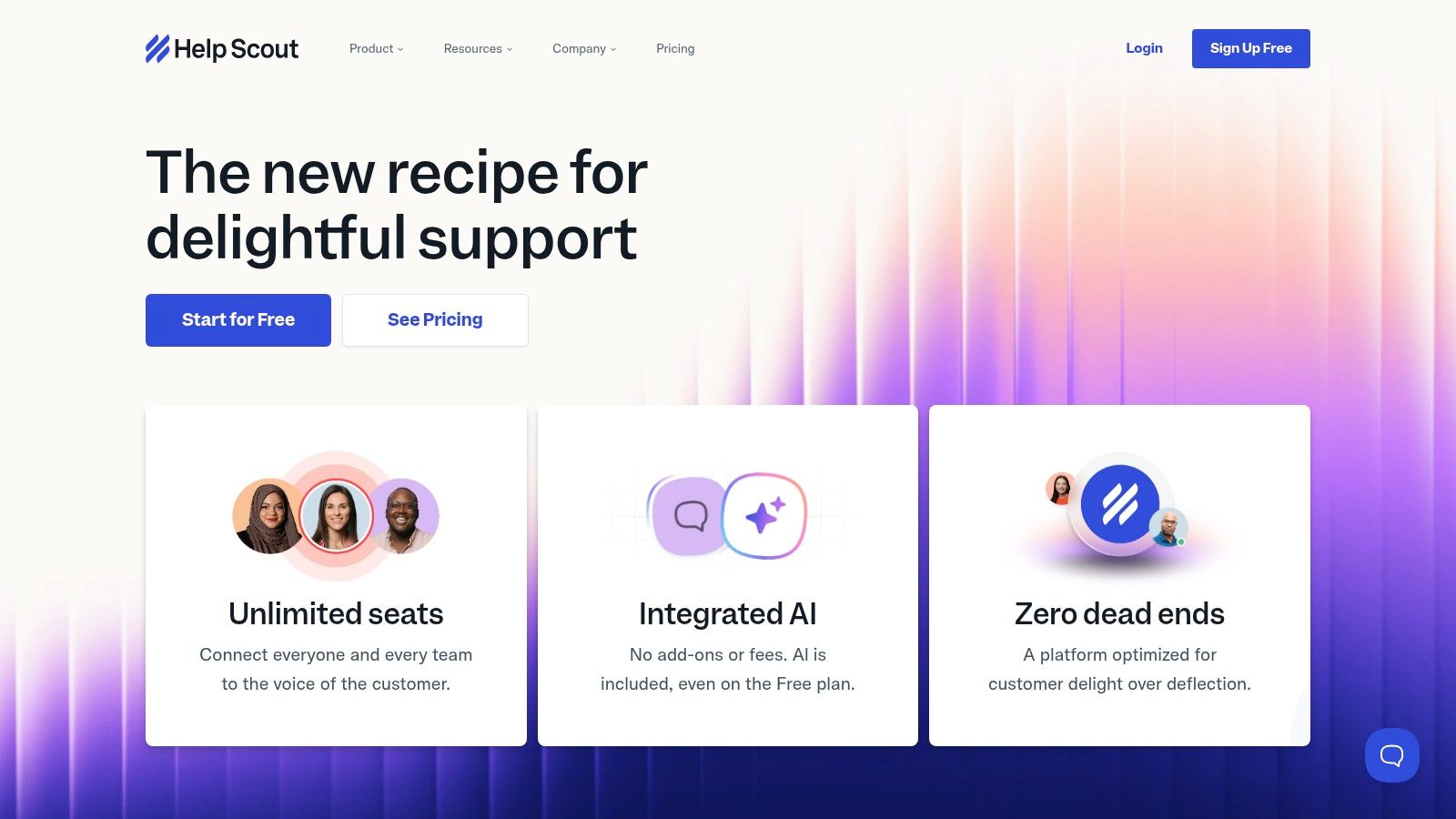
Help Scout earns its place in this help desk software comparison because it excels at providing a balance between powerful features and ease of use. While not as feature-rich as some enterprise-grade solutions, it offers a robust set of tools for most SMBs. Teams looking to improve their customer support workflows without a steep learning curve will appreciate Help Scout’s intuitive design.
Key features that stand out in a help desk software comparison include its collaborative shared inbox, complete with assignment and tagging functionality for efficient teamwork. The Beacon widget allows for seamless in-app and website customer support, enabling proactive engagement and quick problem resolution. Help Scout’s Docs knowledge base platform empowers customers with self-service options, reducing support ticket volume and improving response times. Conversation management features, including collision detection, help prevent duplicated responses and ensure a consistent customer experience. Finally, detailed reporting and customer satisfaction measurement tools provide valuable insights for continuous improvement.
For Jira administrators and DevOps managers evaluating help desk software comparison options, integrating Help Scout can streamline customer issue tracking. While direct integration with Jira might require third-party tools or APIs, Help Scout’s reporting data can be invaluable in understanding customer pain points and informing development priorities.
Sales and marketing teams using HubSpot can benefit from Help Scout’s focus on personalized customer interactions. While a direct integration isn’t native, connecting the two platforms via APIs or third-party tools can enhance customer data sharing and create a more cohesive customer journey. This connection facilitates better lead nurturing and improved customer retention.
Customer support and service agents will appreciate Help Scout’s intuitive interface and streamlined workflows. Features like the shared inbox, collision detection, and customer satisfaction measurement tools directly contribute to increased agent productivity and improved service quality.
Product and project management teams can use Help Scout’s customer feedback and reporting data to prioritize feature development and bug fixes. Understanding customer needs and pain points directly from support interactions can lead to more customer-centric product roadmaps.
Data analysts and reporting specialists can leverage Help Scout’s reporting capabilities to extract valuable insights into customer behavior, support trends, and overall customer satisfaction. This data can be instrumental in identifying areas for improvement and demonstrating the impact of support initiatives.
Pros:
- Clean, intuitive interface requiring minimal training.
- Personal feel without ticket numbers visible to customers.
- Excellent knowledge base functionality with Docs.
- Transparent and predictable pricing structure.
Cons:
- Limited advanced workflow automation compared to competitors like Zendesk or Intercom.
- Fewer integration options than enterprise solutions. Less robust for complex enterprise support needs.
- Limited customization options for larger organizations.
Pricing: Help Scout offers tiered pricing plans based on the number of users and features required, starting at $20/user/month. Check their website for the most up-to-date pricing details.
Technical Requirements: Help Scout is a cloud-based solution, accessible through any modern web browser. No specific hardware or software requirements are listed, other than a stable internet connection.
Implementation/Setup Tips:
- Clearly define your customer support workflows before implementing Help Scout.
- Utilize the Docs knowledge base to empower customers with self-service options.
- Train your team on Help Scout’s features to maximize efficiency.
- Integrate Help Scout with other relevant tools using APIs or third-party connectors.
Website: https://www.helpscout.com/
In the context of help desk software comparison, Help Scout shines as a user-friendly yet powerful solution for SMBs focused on personalized customer service. While it may lack some advanced features found in enterprise-grade solutions, its simplicity, clean interface, and robust core functionality make it a compelling option for businesses seeking a balance between power and ease of use. If your primary goal is to build strong customer relationships and provide excellent support without overwhelming your team with complexity, Help Scout deserves serious consideration in your help desk software comparison process.
7. Zoho Desk
Zoho Desk aims to streamline customer interactions and improve agent efficiency. It distinguishes itself in the crowded help desk software comparison landscape with its context-aware approach, bringing together all relevant customer information into a unified view. This allows agents to personalize support and resolve issues faster. Zoho Desk is particularly attractive to businesses already invested in the Zoho ecosystem, offering seamless integration with Zoho CRM and other business applications. This interconnectedness allows for a comprehensive understanding of the customer journey, further enhancing the quality of support provided.
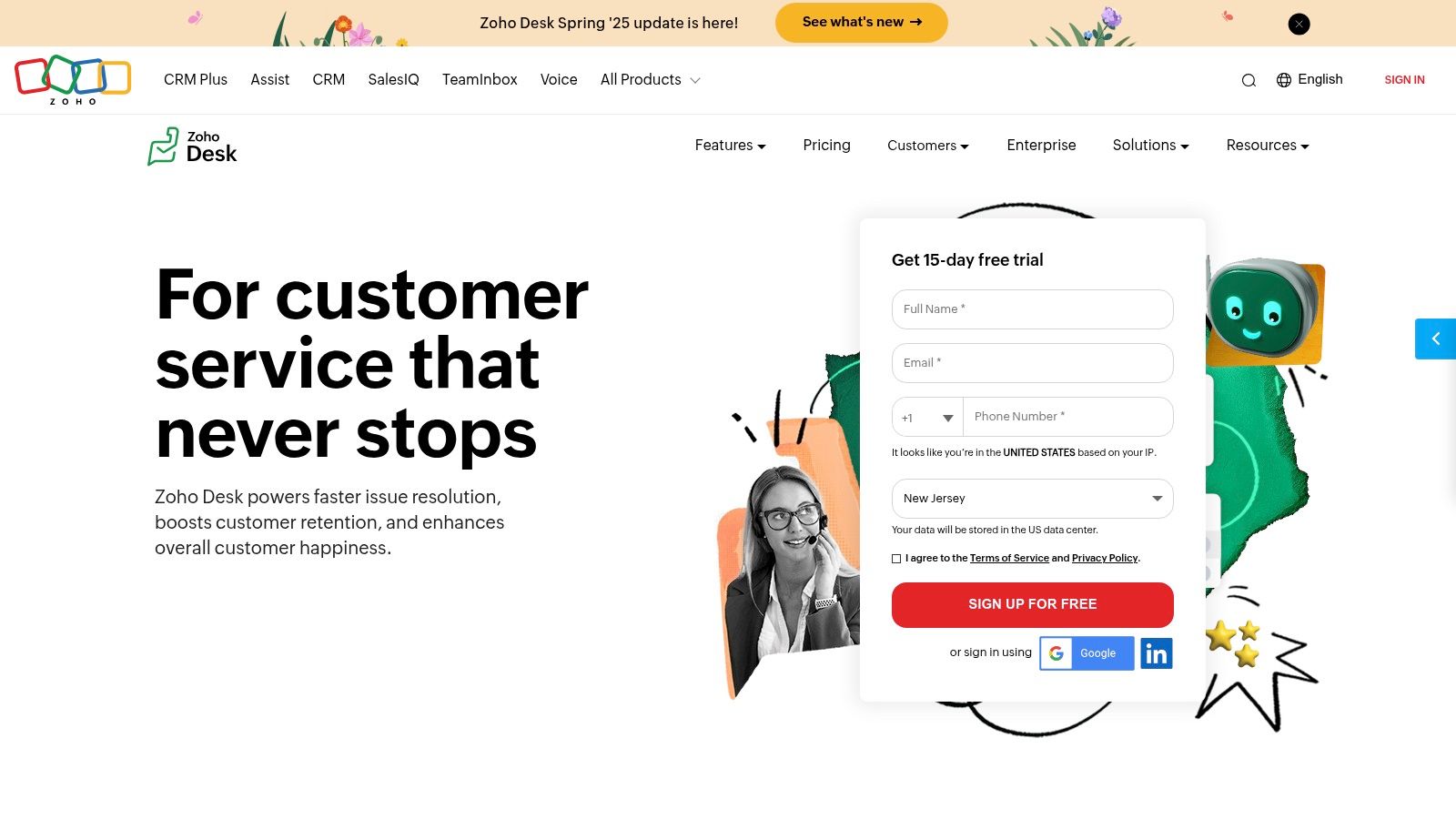
Zoho Desk’s strength lies in providing a comprehensive set of features at a competitive price point, making it a viable option in any help desk software comparison. From multichannel support spanning email, social media, chat, and phone to AI-powered assistance, Zoho Desk equips teams with the tools they need to manage a diverse range of customer interactions. Its AI assistant, Zia, can automate responses, suggest solutions to agents, and even predict customer sentiment. Furthermore, its robust workflow automation capabilities enable businesses to customize processes and automate time-based actions, leading to increased productivity and faster resolution times.
For organizations using Jira, integrating Zoho Desk can bridge the gap between customer support and development teams. While a direct integration isn’t readily available, solutions like Zapier or custom APIs can be used to connect the two platforms. This allows for a more holistic view of the customer journey and facilitates collaboration between teams when addressing customer issues. For example, a bug report raised by a customer in Zoho Desk can automatically create a corresponding Jira issue, simplifying the workflow for both support and development teams.
Similarly, for those using HubSpot, integrating Zoho Desk can further streamline operations. Again, while a direct native integration isn’t available, third-party tools like Zapier can connect the two, allowing for the synchronization of customer data, support tickets, and other relevant information. This unified view helps ensure consistent customer experience across all touchpoints, a crucial aspect for sales and marketing alignment.
Pricing: Zoho Desk offers a free plan for up to 3 agents, followed by paid plans starting at around $14/agent/month. The higher-tier plans unlock advanced features like Zia, advanced automation, and custom reports.
Technical Requirements: Zoho Desk is a cloud-based solution and doesn’t have specific hardware or software requirements beyond a web browser and internet connection.
Setup and Implementation Tips:
- Define your support workflows: Before setting up Zoho Desk, map out your current support processes and identify areas for improvement.
- Customize the self-service portal: A comprehensive knowledge base and FAQ section can deflect a significant number of support tickets.
- Integrate with existing tools: Leverage integrations with other applications, particularly if you use Zoho CRM, Jira, or HubSpot.
- Train your team: Ensure your agents are adequately trained on Zoho Desk’s features and best practices.
Pros:
- Excellent value for the features provided.
- Strong integration with Zoho CRM and other Zoho apps.
- AI capabilities included even in lower-tier plans.
- Highly customizable to match business processes.
Cons:
- Interface can feel dated compared to some competitors.
- Mobile app has limited functionality.
- Setup and configuration can be complex.
- Some users report occasional performance issues.
Website: https://www.zoho.com/desk/
Zoho Desk’s competitive pricing, comprehensive features, and emphasis on context make it a strong contender in any help desk software comparison. Its particular strength lies in its integration within the Zoho ecosystem, making it ideal for businesses already using other Zoho products. However, potential users should be aware of the slightly dated interface and potential complexity in setup and configuration. Weighing these pros and cons against your specific business needs will determine whether Zoho Desk is the right fit for your customer support team. When considering help desk software comparison, especially for users already within the Zoho ecosystem, Zoho Desk provides a robust and valuable solution.
8. LiveAgent
LiveAgent is a help desk software solution that excels in real-time customer support, offering a robust live chat feature alongside comprehensive ticket management. When conducting a help desk software comparison, LiveAgent often stands out due to its focus on speed and affordability. It aims to provide the “fastest live chat on the market,” a crucial factor for businesses prioritizing immediate customer interaction. This all-in-one platform caters to diverse support needs with multi-channel support, automation features, and tools for measuring customer satisfaction. This makes it a strong contender in any help desk software comparison, especially for teams focused on real-time engagement and efficient ticket resolution.
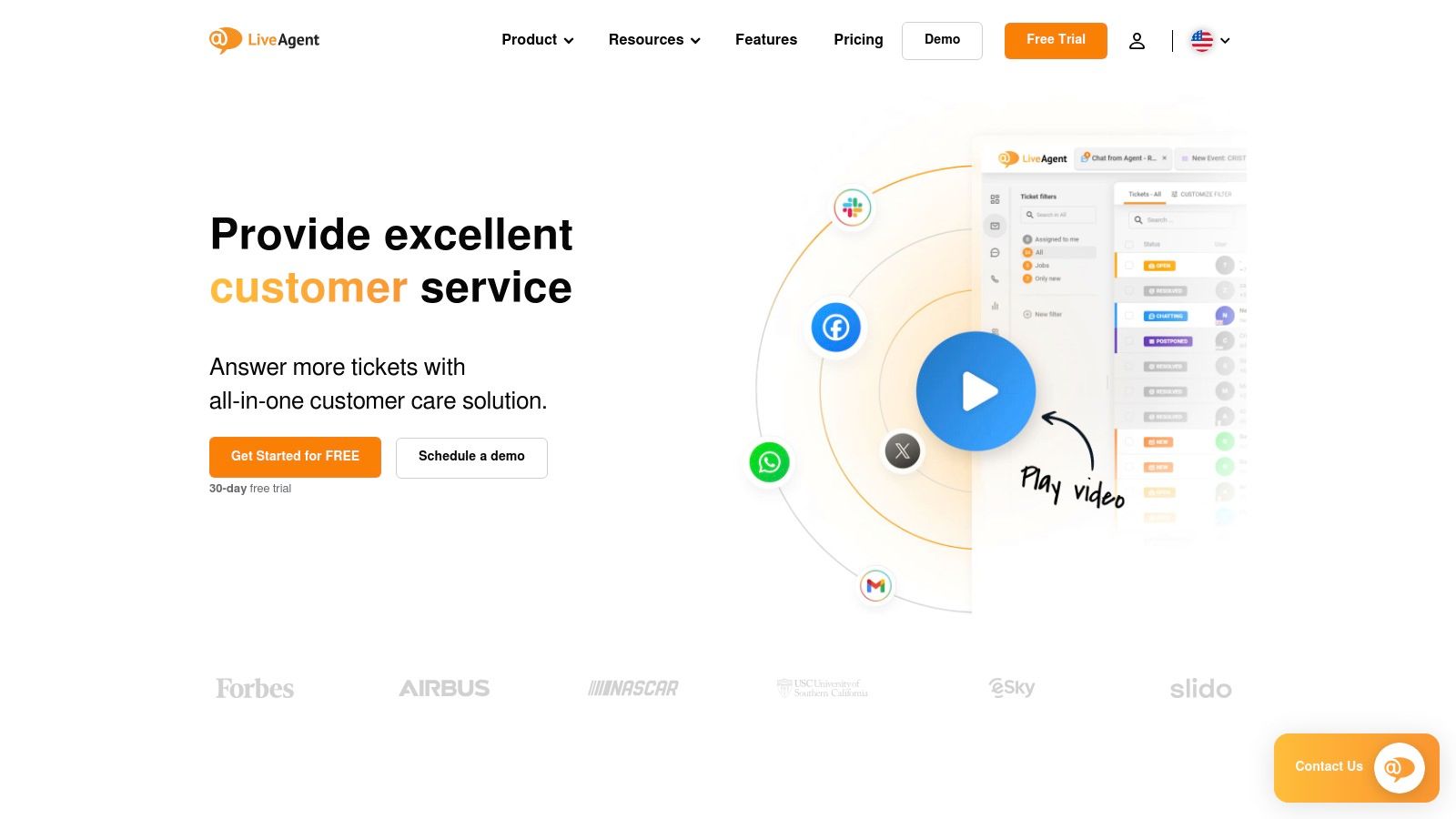
LiveAgent is particularly valuable for sales and marketing teams using HubSpot, customer support agents, and even product/project management teams needing real-time collaboration and feedback channels. For example, sales teams can leverage LiveAgent’s live chat to engage website visitors, answer questions proactively, and qualify leads in real-time. Support agents can utilize the unified inbox to manage all communication channels, ensuring no customer query falls through the cracks. Even product teams can leverage LiveAgent’s feedback mechanisms to gather insights and address issues quickly. This all-in-one approach simplifies help desk software comparison by offering a diverse toolset in one platform.
Key Features of LiveAgent include real-time live chat with visitor monitoring and proactive chat invitations, a universal inbox for managing tickets from all channels (email, social media, etc.), built-in call center functionality including IVR and call routing, time tracking and SLA monitoring, and extensive customization options for forms and customer portals.
Pros:
- Excellent live chat: LiveAgent’s live chat functionality stands out in a help desk software comparison, offering advanced features often lacking in competitors.
- Competitive Pricing: LiveAgent provides a comprehensive feature set at competitive price points, even in its basic plans. This makes it accessible to businesses of all sizes undertaking a help desk software comparison.
- Multilingual Support: Robust multilingual capabilities make LiveAgent an attractive option for companies providing international support.
- Unlimited Tickets: LiveAgent doesn’t impose ticket volume restrictions, even on basic plans, which is a significant advantage in any help desk software comparison.
Cons:
- Overwhelming Interface: The sheer number of features can make the interface feel overwhelming for new users.
- Technical Configuration: Some advanced features require technical expertise to configure properly.
- Reporting Limitations: While functional, LiveAgent’s reporting capabilities aren’t as robust as some competitors offer in a help desk software comparison.
- Mobile Experience: The mobile experience is not as polished or feature-rich as the desktop version.
Pricing: LiveAgent offers a tiered pricing structure based on features and the number of agents. Specific pricing details are available on their website.
Implementation Tips:
- Start with the basics: Focus on implementing core features like live chat and ticket management before exploring advanced functionalities.
- Customize your workflows: Leverage the customization options to tailor LiveAgent to your specific support processes.
- Integrate with existing tools: LiveAgent integrates with various CRM and other business tools. Explore integration options to maximize efficiency.
LiveAgent’s website (https://www.liveagent.com/) offers detailed information about their features, pricing, and support options. Its inclusion in a help desk software comparison is justified by its strong focus on real-time support, competitive pricing, and comprehensive feature set, making it a valuable tool for businesses prioritizing immediate customer engagement. However, Jira administrators and DevOps managers looking for deep integration with Jira might find the integration options limited compared to dedicated Jira-centric solutions. For those primarily using Jira, a help desk software comparison should also consider solutions designed specifically for the Atlassian ecosystem. Data analysts and reporting specialists might find LiveAgent’s reporting features less comprehensive compared to other tools. Therefore, a thorough help desk software comparison requires careful consideration of your specific needs and priorities.
Help Desk Software Feature Comparison
| Solution | Core Features & Integration ✨ | User Experience & Quality ★★★★☆ | Value & Pricing 💰 | Target Audience 👥 | Unique Selling Points 🏆 |
|---|---|---|---|---|---|
| Zendesk | Omnichannel support, AI automation, extensive integrations | Robust reporting, customizable workflows | Higher price, scalable | SMB to Enterprise | AI-powered automation, strong integrations |
| Freshdesk | Multi-channel, automation, collaboration tools | Intuitive UI, quick setup | Affordable, generous free tier | Small teams to enterprises | Ease of use, strong automation at low cost |
| HubSpot Service Hub | HubSpot CRM integration, feedback tools, automation | Unified customer view, strong reporting | Higher cost with multiple products | Marketing, sales, service alignment | All-in-one CRM + service platform |
| ServiceNow | Enterprise ITSM, ITIL-aligned, advanced asset mgmt | Powerful but complex | High cost, enterprise-level | Large enterprises with complex needs | Deep ITSM customization & governance |
| Jira Service Mgmt | Custom workflows, Atlassian integration, ITIL-certified | DevOps-friendly, powerful for tech teams | Mid to high, depends on add-ons | IT & development teams | Tight Atlassian ecosystem integration |
| Help Scout | Shared inbox, in-app support widget, collision detection | Clean UI, easy onboarding | Transparent, predictable pricing | Small to medium businesses | Personal, customer-friendly shared inbox |
| Zoho Desk | Context-aware support, AI assistant, multichannel | Functional but dated UI | Great value, customizable | Businesses using Zoho ecosystem | Strong Zoho integration & AI included |
| LiveAgent | Live chat focus, universal inbox, call center features | Feature-rich but complex UI | Competitive pricing, unlimited tickets | SMBs needing strong live chat + tickets | Fastest live chat, no ticket limits |
Making Your Help Desk Software Comparison Work for You
This help desk software comparison has explored several leading solutions, including Zendesk, Freshdesk, HubSpot Service Hub, ServiceNow, Jira Service Management, Help Scout, Zoho Desk, and LiveAgent. Each platform offers unique strengths and caters to different needs, from simple ticketing systems to complex IT service management. Remember, the best help desk software for your team depends on your specific workflows, customer base, and integration requirements. A key part of providing excellent customer service is having a robust help desk knowledge base. Check out this article for tips on setting one up and making it successful from Help Desk Knowledge Base: Setup & Success Guide by Hypertype.
Key takeaways from this help desk software comparison include the importance of features like automation, reporting, and integration capabilities. For teams already leveraging the power of HubSpot and Jira, seamless data flow between these platforms is critical. Efficient help desk software comparison should also consider the ability to automate ticket creation, synchronize customer data, and streamline communication between support, development, sales, and marketing teams. Consider which software best aligns with your team’s existing tools and workflows. Are you primarily using Jira for development? Does your sales team live in HubSpot? Understanding these dependencies will significantly impact your decision.
When implementing a new help desk solution, consider these critical factors: budget, scalability, ease of use, and the level of customization available. Thoroughly evaluate the onboarding process and available training resources. User adoption is key to maximizing your return on investment, so choose a platform that your team will readily embrace. For those focused on data analysis and reporting, prioritize solutions that offer comprehensive dashboards and customizable reports to track key performance indicators (KPIs) and drive continuous improvement.
Choosing the right help desk software can transform your customer support, empowering your team to deliver exceptional service and improve customer satisfaction. By carefully evaluating your options through a detailed help desk software comparison, you can equip your team with the tools they need to succeed. Streamline your support workflows and enhance collaboration between your HubSpot and Jira instances. Explore resolution Reichert Network Solutions GmbH, offering powerful integrations like the HubSpot for Jira app available on the Atlassian Marketplace, to maximize the synergy between your platforms. Visit resolution Reichert Network Solutions GmbH to learn more and begin your free trial today!
